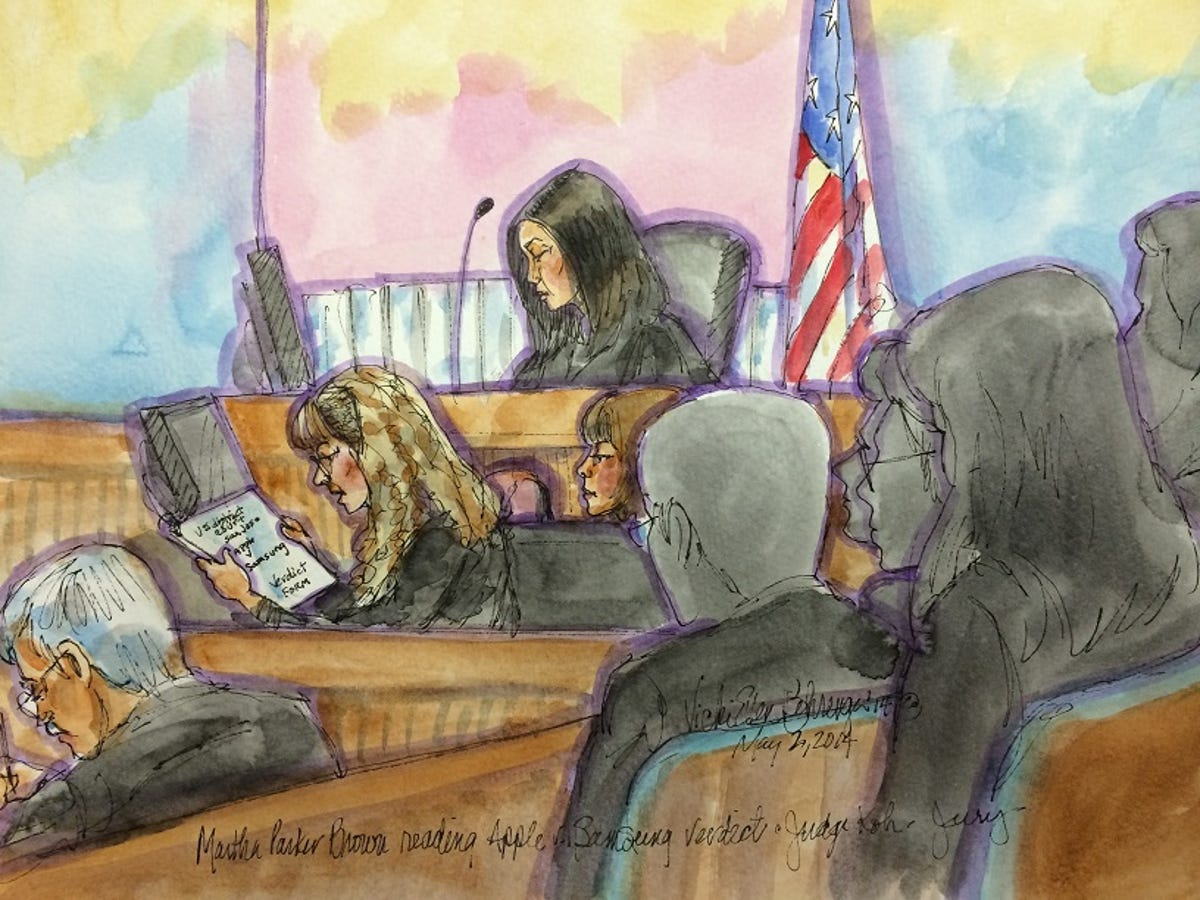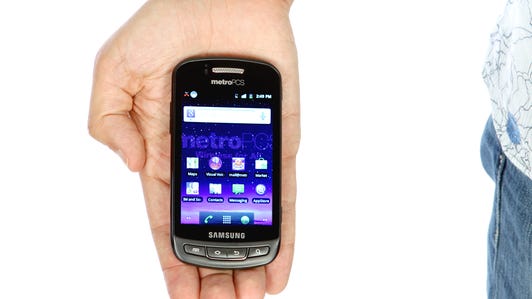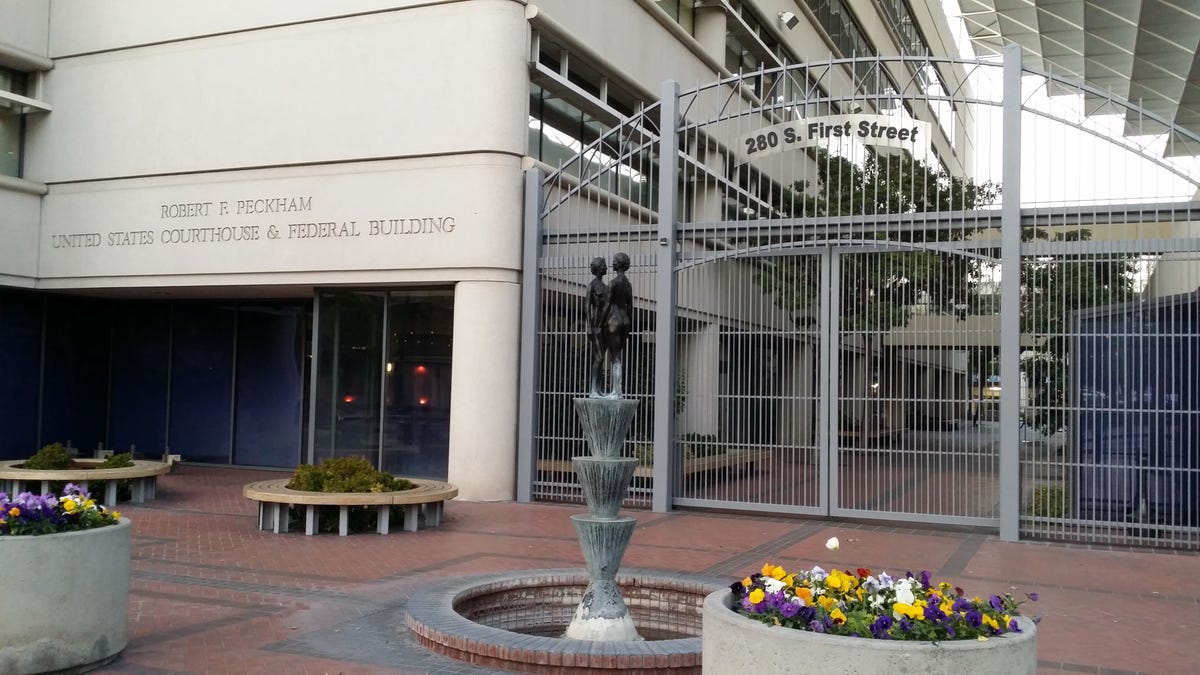
Vicki Behringer
SAN JOSE, Calif. — An eight-person jury on Friday handed back a mixed verdict in the Apple v. Samsung patent-infringement case, determining that both companies were guilty in some aspects but not guilty in others.
The jury found all of Samsung’s accused gadgets infringed Apple’s ‘647 “quick links” patent but that none infringed the ‘959 “universal search” patent or the ‘414 “background sync” patent. Results were mixed for the ‘721 “slide to unlock” patent, with some Samsung devices, such as the Galaxy Nexus, found to infringe, and others found not to. Judge Lucy Koh, in a pretrial judgement, had already ruled that Samsung infringed the ‘172 “automatic word correction” patent, and the jury simply calculated damages.
The jury awarded Apple only $119.6 million for Samsung’s infringement, much less than the $2.2 billion it had requested.
Apple v. Samsung 2014: The infringing devices (pictures)






Meanwhile, the jury also determined that Apple infringed Samsung’s ‘449 patent for photo and video organization in folders and awarded the Korean company $158,400. Samsung had accused Apple of infringing two patents and asked for damages of about $6.2 million.
The jury will return Monday at 9 a.m. to reconsider one of the damages figures. It awarded Apple no damages for one version of the Galaxy S2, but Apple believes it should be awarded some money for Samsung’s infringement of the ‘172 patent.
Asked for a response to today’s events, a Samsung spokesperson said, “It is inappropriate to comment while the jury is still deliberating.”
Apple said in a statement that it’s “grateful to the jury and court for their service.”
“Today’s ruling reinforces what courts around the world have already found: that Samsung willfully stole our ideas and copied our products. We are fighting to defend the hard work that goes into beloved products like the iPhone, which our employees devote their lives to designing and delivering for our customers.”
Apple v. Samsung – completed jury form
The jury reached its verdict shortly before 4:30 p.m. PT Friday, the end of the third full day of deliberations. The verdict was read to the court about half an hour later.
The results of the trial are less clear cut than the previous patent-infringement case and damages retrial that netted Apple about $930 million. However, the results likely will be viewed as a victory for Samsung. The damages amount owed to Apple fall far below the company’s request, and Samsung wasn’t found to infringe all of Apple’s patents. In addition, Apple was found to infringe one of Samsung’s patents, something that didn’t occur in the previous trial.
“This outcome feels like a defensive victory for Samsung, but not a particularly shocking one,” said Brian Love, assistant professor at the Santa Clara University School of Law. “With Google directly involved in developing the allegedly infringing software, Apple’s claims that Samsung blatantly copied the iPhone never rang true.”
Chart: Guilty gadgets
Almost two years after Apple and Samsung faced off in a messy patent dispute, the smartphone and tablet rivals returned to the same courtroom here to battle once again over patents before Judge Koh. Apple argued that Samsung infringed on five of its patents for the iPhone, its biggest moneymaker, and that Apple was due $2.2 billion for that infringement. Samsung wanted about $6.2 million from Apple for infringing two of its software patents, and it argued that even if it did infringe all of Apple’s patents, it should have to pay only $38.4 million.
While the companies asked for damages, the case is about more than money. What’s really at stake is the market for mobile devices. Apple now gets two-thirds of its sales from the iPhone and iPad; South Korea-based Samsung is the world’s largest maker of smartphones; and both want to keep dominating the market. So far, Apple is ahead when it comes to litigation in the US. Samsung has been ordered to pay the company about $930 million in damages.
The two companies presented their closing arguments Tuesday. The case was then handed to the jury of four men and four women shortly before 3 p.m. PT that day. The jury was made up of tech novices such as a police officer and a retired teacher. Only one member, a former IBM software executive, had experience in technology, while another works in renewable energy.


Now playing:
Watch this:
Jury awards Apple far less than it wanted in Apple v….
1:42
In the case, Apple and Samsung accused each other of copying features used in their popular smartphones and tablets. The trial involved different patents and newer devices than the ones disputed at trial in August 2012 and in a damages retrial in November 2013. For instance, the new trial involved the iPhone 5 , released in September 2012, and Samsung’s Galaxy S3 , which also debuted in 2012.
Most Samsung features that Apple said infringe are items that are a part of Android, Google’s mobile operating system that powers Samsung’s devices. All patents except one, called “slide to unlock,” are built into Android, Samsung said. Apple has argued the patent infringement trial has nothing to do with Android. However, Samsung called Apple’s suit an
and said that Google had invented certain features before Apple patented them. It came out during the trial that Google has been helping Samsung fund its defense against a couple of Apple’s patent claims because of a “Mobile Application Distribution Agreement” for Samsung to use Google’s apps.
Suing Google wouldn’t get Apple far since Google doesn’t make its own phones or tablets. Instead, Apple has sued companies that sell physical devices using Android, a rival to Apple’s iOS mobile operating system. In particular, Apple believes Samsung has followed a strategy to copy its products and then undercut Apple’s pricing.
The monthlong trial, which kicked off March 31 with jury selection, included about 52 hours of testimony, three hours of opening arguments, and four hours of closings. It covered everything from the invention of the technology at issue in the case to what damages should total. Apple argued throughout the trial that its case was about Samsung, not Google, and that Samsung copied Apple out of desperation. Samsung, meanwhile, argued that Apple’s suit was about hurting competition and Android.
See also
- Apple v. Samsung: All you need to know about latest patent trial (FAQ)
- Jury asks for more info in Apple v. Samsung — including what Steve Jobs directed
- Samsung: You can’t copy iPhone features if iPhones don’t use them
- Apple makes final pitch in patent infringement case against Samsung
- Google agreed to pony up for Samsung’s defense against Apple
An appeals court ruling April 25 in Apple’s related patent-infringement suit against Motorola threw a wrench in the Apple v. Samsung case, extending the duration of the trial by one day to give the parties one additional hour each — on top of the 25 apiece they already had — to present more evidence. The US Court of Appeals for the Federal Circuit on Friday upheld a ruling by Judge A. Posner of the Northern District of Illinois that determined a specific interpretation of Apple’s ‘647 “quick links” patent. Koh had allowed the patent, particularly the use of an analyzer server, to be interpreted in a way in the current trial that differed from Posner’s accepted meaning, so she allowed Samsung and Apple to address the patent Monday.
There were seven patents at issue in the latest case — five held by Apple and two by Samsung. Apple accused Samsung of infringing US patents Nos. 5,946,647; 6,847,959; 7,761,414; 8,046,721; and 8,074,172. All relate to software features, such as quick links for ‘647, universal search for ‘959, background syncing for ‘414, slide-to-unlock for ‘721, and automatic word correction for ‘172. Overall, Apple argued that the patents enable ease of use and make a user interface more engaging.
Samsung, meanwhile, has accused Apple of infringing US patents Nos. 6,226,449 and 5,579,239. The ‘449 patent, which Samsung purchased from Hitachi, involves camera and folder organization functionality. The ‘239 patent, which Samsung also acquired, covers video transmission functionality and could have implications for Apple’s use of FaceTime.


Shara Tibken/CNET
The Samsung gadgets that Apple said infringe are the Admire, Galaxy Nexus , Galaxy Note , Galaxy Note 2, Galaxy S II, Galaxy SII Epic 4G Touch, Galaxy SII Skyrocket, Galaxy S3, Galaxy Tab 2 10.1, and the Stratosphere. Samsung, meanwhile, said the iPhone 4 , iPhone 4S , iPhone 5, iPod Touch (fifth generation), and iPod Touch (fourth generation) all infringe. Samsung initially accused the iPad 2 , iPad 3, iPad 4, and iPad Mini of infringing its ‘239 patent, but it later dropped those claims. That also reduced the amount Samsung wanted in damages to $6.2 million from its originally requested $6.8 million.
The trial contained testimony by numerous technical and damages experts, as well as people who invented the technology at issue in the case.
The first day of arguments featured testimony by Phil Schiller, Apple’s head of marketing. Other witnesses who have testified for Apple include Greg Christie, an Apple engineer who invented the slide-to-unlock iPhone feature; Thomas Deniau, a France-based Apple engineer who helped develop the company’s quick link technology; and Justin Denison, chief strategy officer of Samsung Telecommunications America. Denison’s testimony came via a deposition video.
The crux of Apple’s case came with two expert witnesses, John Hauser, the Kirin professor of marketing at the MIT Sloan School of Management; and Christopher Vellturo, an economist and principal at consultancy Quantitative Economic Solutions. Hauser conducted a conjoint study that determined Apple’s patented features made Samsung’s devices more appealing, while Vellturo determined the amount of damages Apple should be due for Samsung’s infringement: $2.191 billion.
Related links
- Samsung: Apple ‘vastly overstated’ scope of patents
- Samsung: Apple’s case ‘is an attack on Android’
- Apple: Samsung patent case is not about Google
- Apple says Samsung copied iPhone after suffering ‘crisis of design’
- Tech novices set to determine the fate of Apple v. Samsung
Samsung, which launched its defense April 11 after Apple rested its case, called several Google engineers to the stand to testify about the early days of Android and technology they created before Apple received its patents. Hiroshi Lockheimer, Google vice president of engineering for Android, said his company never copied iPhone features for Android. Other Google Android engineers, Bjorn Bringert and Dianne Hackborn, also testified about features of the operating system.
High-ranking Samsung executives, including former Samsung Telecommunications America CEO Dale Sohn and STA Chief Marketing Officer Todd Pendleton, also took the stand during the monthlong trial. The two executives testified about Samsung’s marketing push for the Galaxy S2 and other devices, saying a shift in the Korean company’s sales and marketing efforts — not copying Apple — boosted its position in the smartphone market.
The latter half of the trial largely featured experts hired by Samsung to dispute the validity of Apple’s patents and to argue that Samsung didn’t infringe. David Reibstein, chaired professor of marketing at the University of Pennsylvania’s Wharton School of Business, refuted Apple expert Hauser’s testimony from earlier in the trial. Judith Chevalier, a professor of economics and finance at the Yale University School of Management who was hired by Samsung, said her analysis determined that a reasonable royalty for Samsung’s assumed infringement would be $1.75 per device, or $38.4 million overall. Apple had argued it deserved $40 per device for infringement as well as lost profits for a total of $2.191 billion.
After presenting its defense, Samsung on April 21 launched its own infringement suit against Apple. Dan Schonfeld, a professor of computer science at the University of Illinois at Chicago, testified that Apple infringed the ‘239 patent in its iPhone through the use of FaceTime and a feature for attaching video to messages and mail. And Ken Parulski, another expert who was part of the Kodak team that developed the world’s first color digital camera, testified that Apple infringed another Samsung patent for organizing video and photos in folders.
James Storer, a professor of computer science at Brandeis University hired by Apple as an expert witness, then testified April 22 that Apple didn’t infringe Samsung’s patents. The company then called witnesses such as Apple engineers Tim Millet and Roberto Garcia to testify about the creation of technology used in iPhones and iPads. Millet serves as senior director of platform architecture at Apple, helping create the processors that power iOS devices. Garcia, meanwhile talked about the creation of the FaceTime technology that has been accused of infringing a Samsung patent.
Up close and personal with the Samsung Galaxy S3 (pictures)









